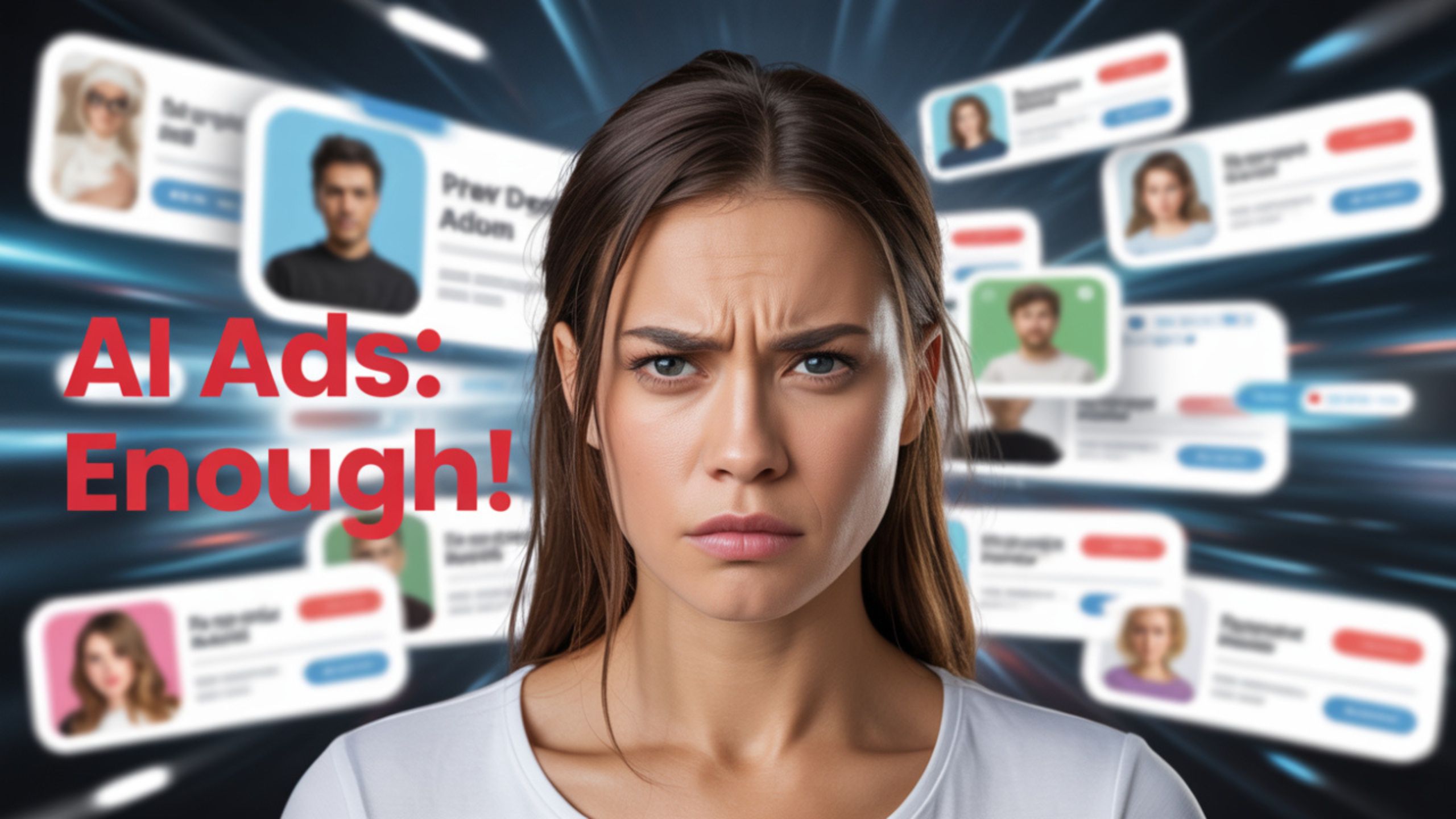AI-Powered Ads Are Becoming Annoying– In the digital marketing world, AI-generated advertisements were introduced with the promise of personalization, efficiency, and cost-effectiveness. However, many users now find themselves bombarded by repetitive, intrusive, and poorly targeted ad experiences instead of being helpful. It’s no longer a question of whether AI can help advertisers — the bigger concern is: are AI ads pushing users away?
The Rise of AI in Advertising: A Double-Edged Sword
AI has revolutionized the ad industry. With real-time analytics, predictive behavior modeling, and machine learning, AI offers advertisers a way to target users with surgical precision. Yet this same hyper-targeting, ironically, has led to user fatigue and ad blindness.
Instead of offering relevant, timely content, AI repeatedly repeats the same messages, products, or services, resulting in what can best be described as “annoying advertisement loops.”
Over-Personalization: When Ads Get Creepy
One of the most disturbing trends in AI advertising is over-personalization. Algorithms analyze browsing history, purchases, and even private conversations (in cases where microphone permissions are abused) to generate ads. This often makes users feel watched, manipulated, and uneasy.
For instance, searching for a pair of shoes once might result in seeing the same product ad across every device and platform for weeks, regardless of whether the user has already made the purchase. This relentless retargeting creates a sense of digital harassment.
Repetition Without Reason: The Curse of Predictive Ad Loops
AI operates on patterns — but what happens when it misinterprets those patterns? Users end up caught in predictive loops, where the same content is repeatedly shown under the assumption that repetition equals interest.
This mechanical approach reduces the effectiveness of ads and leads users to associate brands with irritation, rather than trust or value. AI often ignores context, emotional tone, or user intent, leading to tone-deaf adstone-deaf ads misaligned with the user’s mindset.
Poor Ad Placement and Intrusive Formats
Another reason users are pushing back is the sheer aggressiveness of AI-placed ads. Pop-ups, autoplay videos, and full-screen interstitials dominate mobile and desktop experiences. AI often fails to optimize for user experience, focusing solely on engagement metrics like CTR or time spent.
As a result, webpages are slowed down, content is hidden, and users are forced to interact with ads they never asked for. These ads are sometimes placed next to inappropriate or sensitive content due to algorithmic misjudgment.
Lack of Human Touch: The Void of Creativity and Empathy
Great advertising has always relied on empathy, storytelling, and emotional resonance. However, most AI-generated ads are void of these qualities. They are often cookie-cutter templates filled with recycled slogans and automated creatives.
This lack of originality and nuance makes AI ads feel generic, robotic, and forgettable. The absence of a human touch means that the ads don’t speak to the real needs or emotions of the audience — only their metadata.
The User Backlash: Ad Blockers, Opt-Outs, and Growing Distrust
The growing annoyance with AI ads has led to a sharp increase in the use of:
- Ad blockers
- Incognito/private browsing
- Tracking prevention software
- Subscription models that promise an ad-free experience
Users are actively opting out, and some platforms are even penalized for over-aggressive ad behavior, resulting in lower engagement and higher bounce rates. Consumers are no longer passive targets — they are pushing back, and AI ads are losing their influence.
Data Misuse and Privacy Concerns
Another major concern is how AI collects and utilizes data. Many users feel betrayed when ads show that their private information has been compromised. Whether through shady third-party trackers or intrusive app permissions, AI-powered ad systems are often perceived as violators of user trust.
Worse, some companies deploy dark patterns — manipulative tactics designed to trick users into clicking or accepting privacy terms without informed consent. This further damages the reputation of AI-driven advertising.
How Brands Can Fix the Problem: Smarter AI and Ethical Advertising
To restore trust and reduce annoyance, brands must rethink their approach to AI advertising. Here’s how:
- Invest in context-aware AI that understands why a user might be interested in a product — not just what they clicked on last.
- Limit ad frequency to prevent burnout. Just because a user saw an ad doesn’t mean they want to see it again ten more times.
- Add emotional intelligence to AI scripts. Include parameters that recognize tone, sentiment, and intent.
- Use first-party data responsibly and avoid aggressive retargeting.
- Incorporate creative professionals into the process — even AI needs a spark of humanity to connect effectively.
The Future: Human-AI Collaboration, Not Replacement
AI is not going away. But its role in advertising must evolve from “mechanical decision-maker” to “intelligent assistant.” The future lies in collaboration between skilled marketers and AI tools, where each complements the other.
With the right balance, we can create personalized, ethical, creative, and — most importantly — not annoying ads. We need to move from artificial intrusion to authentic interaction.
Wrap Up: AI Ads Must Respect the User Experience
If AI-generated ads are to remain relevant and effective, they must prioritize user respect, contextual relevance, and ethical use of data. Brands that fail to evolve risk being muted, blocked, or abandoned by their audience.
In the end, advertising should be a conversation, not a confrontation. Until AI systems learn that, they’ll continue being perceived not as helpful tools — but as annoying advertisement agencies.

Selva Ganesh is a Computer Science Engineer, Android Developer, and Tech Enthusiast. As the Chief Editor of this blog, he brings over 10 years of experience in Android development and professional blogging. He has completed multiple courses under the Google News Initiative, enhancing his expertise in digital journalism and content accuracy. Selva also manages Android Infotech, a globally recognized platform known for its practical, solution-focused articles that help users resolve Android-related issues.





Too pushy and intrusive!
It feels like they’re tracking too much about me.
AI might be efficient for businesses but not for users.
I install extensions just to block them.
User experience is being sacrificed for revenue.
User experience is being sacrificed for revenue.
User experience is being sacrificed for revenue.
This trend is getting worse over time.
Ads keep showing up for things I already bought.
Sometimes the same ad shows 20 times a day.
These ads pop up even when I’m not interested.
Ads keep showing up for things I already bought.
I would prefer fewer but relevant ads.
AI might be efficient for businesses but not for users.
Even in apps, they appear nonstop.
I used to like targeted ads, but now it’s overwhelming.
Ad-blockers are my only solution now.
The ads feel robotic and impersonal.
Annoying to see irrelevant ads all the time.
Ads keep showing up for things I already bought.
They repeat the same thing again and again.
AI ads don’t understand real human needs.
AI ads feel more annoying than helpful.
The same product ad follows me on every site.
Even in apps, they appear nonstop.
Too pushy and intrusive!
I skip every ad without even looking at it.
Honestly, I stopped noticing them anymore.
AI ads feel more annoying than helpful.
I don’t trust these AI ad recommendations.
AI might be efficient for businesses but not for users.
Clickbait ads everywhere!
Instead of personalization, I get spammed with irrelevant stuff.
They appear in the middle of my videos, so frustrating!
They repeat the same thing again and again.
This trend is getting worse over time.
Not everything can be automated with AI.
AI ads are more irritating than useful.
They should make ads less repetitive.
Not everything can be automated with AI.
AI should improve relevance, not ruin it.
This trend is getting worse over time.
Personalization has turned into harassment.
Feels like being stalked by ads everywhere.
These ads are the reason people dislike online shopping.
They repeat the same thing again and again.
Annoying to see irrelevant ads all the time.
Instead of personalization, I get spammed with irrelevant stuff.
Ad-blockers are my only solution now.
I don’t trust these AI ad recommendations.
AI ads are ruining social media feeds.